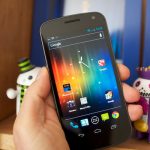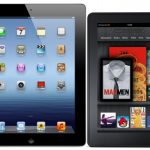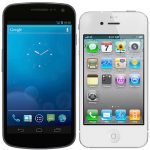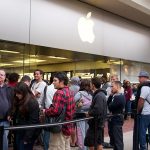The personal cloud is all about context

Gartner is back thumping about how the cloud will replace the PC as personal hub by 2014, and, whoa, that's not exactly so far away. I wrote the "ding dong, the PC's dead" last month. After identifying five trends then, the analyst firm today highlights three things cloud vendors had better watch out for.
Simply stated: "Mobility and location"; "platform independence"; and "seamless synchronization". That aptly describes what the cloud-connected -- oh, post-PC, if you insist -- era is all about: Personal computing anytime, anywhere on anything. However, many cloud offerings fall short of that definition and the three must-have characteristics Gartner defines.
Android rises over fallen iPhone

I must really be asleep at the wheel. How could I have possibly missed this nearly week-old sales data: iPhone's fourth-quarter sales surge against Android was a blip on the screen. Chock it up to iPhone 4S launch combined with the saddest of sales motivators: Rock star's death halo, where album sales soar following an artist's death, or in this case iPhone following Apple cofounder Steve Jobs' tragic passing. Perhaps you have another reason. Regardless, sales don't lie.
Android smartphone OS market share, as measured in actual sales to people (and not shipments to stores), reached 61 percent during Q1 compared to a measly 29 percent for iOS/iPhone. That's a dramatic turnabout from fourth quarter when Android led by a narrower margin -- 48 percent to 43 percent. Still, like fourth quarter, the top-three selling smartphones were iPhone, iPhone and iPhone, as in 4S, 4 and 3GS in that order.
The mobile web is dead

Today, comScore released startling data about the mobile web, which bodes poorly for the browser. In March, the web browser accounted for just 18.5 percent of time spent online among US smartphone users. Mobile apps accounted for the rest. Now we know why Safari for iOS capabilities advance so sparingly: Apple sees it as irrelevant. Stated differently: Safari is to mobile what Internet Explorer 6 was to the desktop 10 years ago. Apps matter more to both developers.
Qualifying that one country does not the whole world make, the US data nevertheless foreshadows future trends and illuminates the past, demonstrating the wisdom of Apple's 2008 turnabout. When iPhone launched in June 2007, cofounder Steve Jobs couldn't say enough about Safari as a key user benefit. But by early 2008, Jobs and company shifted emphasis to the App Store, which launched in July of that year. In essence, Apple bet against the web after foaming at the mouth about open standards. Apps better fit Apple's "our way or the highway" approach to end-to-end hardware, software and supporting services. Only Google can save the mobile web now.
Google+ gets a killer app

What do you get when Google+ and YouTube reproduce? Hangouts on Air, which today is available globally -- well, if that's how you view 20 countries (or so it looks from the list I see). My question: What does this mean for the future of services like USTREAM? Given Google's reach with search and video services, and the growing social network, coupled with Google Plus Your World, my answer is "uh-oh".
Google+ debuted nearly 11 months ago in beta, with the Hangouts video-sharing service being one of its stand-out, and stand-apart-from-Facebook, features. Hangouts lets Google+ users video chat with up to 10 people. In September 2011, Google+ opened to the public, with big upgrades to Hangouts: "On Air", which allows watching beyond the 10 participants; mobile broadcasting for Android 2.3 and above; and collaboration, which reached beyond YouTube to shared screens, sketchpads and Docs. Today's broadened availability is all about enabling millions of self-broadcasters to reach wide audiences at low cost.
Google Galaxy Nexus first-impressions review

Two days ago, May 4, I received the Samsung Galaxy Nexus -- the 16GB HSPA+ model Google started selling direct last week. I'm not alone. Many of you ordered this phone, too. This first-impressions post extends my December review of the 32GB Verizon LTE model.
I will say straight up that out-of-box experience on AT&T is nowhere as good as Verizon. Network is huge factor. Audio quality is crisp and clear on Verizon compared to occasional hissy-fits on AT&T. Data speed isn't comparable, so far -- that's round and about San Diego and communities East and South, La Mesa and Lemon Grove, respectively. I expected at least 10Mbps HSPA+ data speed, based on my wife's Samsung Galaxy S II Skyrocket (before AT&T turned on LTE service here). I've yet to top 3.5Mbps on AT&T HSPA+ compared to an average 20Mbps over Verizon LTE. If data throughput is a priority, Galaxy Nexus HSPA+ -- over AT&T anyway -- is not for you. However, if you want a GSM network phone that is unlocked and contract-free and offers the best of Android, Google Galaxy Nexus is an exceptionally good choice. But expect to make a few compromises.
Is iPhone 4S obsolete?

I repeatedly ask you questions in headlines, because I ask myself. This one is top of my mind following today's Samsung Galaxy S III announcement. My eyes bugger at the differences in size, features and most importantly benefits -- the majority of those coming from Samsung skinning Android 4 into seeming oblivion. It's hard to discern a way that Galaxy S3 isn't superior to iPhone 4S. If iOS 5 looked antiquated before, and it surely did, Samsung's TouchWiz-modified Ice Cream Sandwich makes it suddenly ancient.
But the question is bigger than hardware or software. Samsung isn't the world's No. 1 handset maker overall and in smartphones by lark. Apple is known for focusing on delivering benefits that matter, sometimes at the expense of hardware capabilities, and truly aspirational marketing. Galaxy S III evokes these qualities, with something more: real benefits without sacrificing hardware capabilities while using software to enrich the human experience. Then there's the aspirational marketing, as seen in the embedded video. Samsung does something Apple-like, only better.
New iPad extinguishes Kindle Fire

Yesterday, colleague Ed Oswald gave four very good reasons why Target is dumping Amazon ereaders and tablets. For Kindle Fire, perhaps there is another: It's not selling. Today, IDC reports that Amazon tablet shipments collapsed during first quarter, all while iPad lapped them up.
"Apple reasserted its dominance in the market this quarter, driving huge shipment totals at a time when all but a few Android vendors saw their numbers drop precipitously after posting big gains during the holiday buying season" said Tom Mainelli, IDC research director. Apple's media tablet share rose to 68 percent from 54.7 percent during fourth quarter. Kindle Fire's shipments collapsed -- from 4.7 million to around 700,000 quarter on quarter. Amazon's share dropped from 16.8 percent to 4 percent, placing it third to Samsung.
Who will buy Galaxy Nexus from Google?

While we wait for Samsung to unveil its new smartphone in a few hours, for your waiting pleasure I've got answers to the question posed last week: "Would you pay Google $399 for unlocked, HSPA+ Galaxy Nexus?" The search and information giant ended April with a May flower: Direct sales of its flagship, Android 4.0 smartphone, presumably because AT&T and T-Mobile aren't doing so.
Google's got a good thing going here for Android enthusiasts, but I've got a problem with the direct sales thing. What Apple offers that its rival can't: Service. People buying iPhone can get defective replacement at local Apple stores. They also can purchase, granted for an extra 99 bucks, AppleCare+, which extends the basic warranty and provides discounted replacements. If you drop and break iPhone 4S, Apple will replace it for $49, up to two times. What's Google going to do for you, if Galaxy Nexus goes bust or you bust it up?
Is there hope for Windows Phone?

That's the question I'm asking after looking over comScore US mobile subscriber data for the three months ending in March. After years of steady, steep declines, Windows Phone subscriber share held steady from February to March, which perhaps not coincidentally is when Nokia Lumia 900 went on sale. Could it be...
comScore measures subscribers 13 years and older. Microsoft mobile share among smartphone subscribers held steady at 3.9 percent month-on-month, the first real stop in drop in years. How mighty is Microsoft's fall? Market share was 19 percent in September 2009, for example. So 3.9 percent is nothing to skinny, but staying there rather than going down is small, but notable improvement.
Chrome marketing is exceptional

Love makes the world go round, and, c`mon, who doesn't love a good relationship story? But love stories aren't easily told -- one reason there are so few classics. But Google has done just that in 90 seconds. Take a moment to watch the embedded video over your morning coffee and bagel, donut or scone and tell me if you agree.
I don't even recall where I saw the commercial -- it was during some program I had recorded then watched on Monday evening. But as I fast-forwarded through the adverts, something about this one caused me to stop. Perhaps it's subliminally related to the long length, seeing as most TV spots are no longer than 60 seconds. I actually rewound and watched a second time. Now that's marketing.
Samsung smartphone shipments soar stunning 267%, trouncing iPhone

Apple apologists' brief respite is over. Late last week, IHS iSuppli and Strategy Analytics released first quarter data putting Samsung handset shipments ahead of Nokia, ending the Finnish company's 14-year reign. But the analyst firms couldn't agree on smartphones, with Strategy Analytics positioning Samsung ahead of Apple, but IHS giving the nod to iPhone. The Apple Fanclub clung to the "We're No. 1!" data, unsurprisingly. But the last word comes today from IDC, which corroborates Strategy Analytics, crowning Samsung king in both categories.
"The halcyon days of rapid growth in the smartphone market have been good to Samsung", Kevin Restivo, IDC senior research analyst, says. "Samsung has used its established relationships with carriers in a mix of economically diverse markets to gain share organically and at the expense of former high fliers such as Nokia".
Android 4 share soars

I don't know how cellular carriers or device makers could move any slower serving Ice Cream Sandwich to their customers. Still, someone is making progress, seven months after Google formally unveiled the OS and six after the first device with it shipped. Android 4.0 share jumped dramatically from mid March to mid April, granted from a small base. It's about time.
This morning I wrote a mobile browser usage story and checked official statistics on Android usage, which is based on the number of devices connecting to Google Play during the pervious 14 days. That number: 2.9 percent. Hours later, when doing a second browser story -- on desktops -- I double checked, more as formality. To my surprise, Google updated the data as of today: 4.9 percent.
Internet Explorer rises from the dead, and, whoa, that's not good for Firefox

What seemingly started as a fluke, suddenly is a trend. In April, Internet Explorer gained usage share for the fourth consecutive month, reversing a long, steady decline. That's the view presented by April browser usage data Net Applications released today. IE share rose to 54.09 percent -- that's up from 53.83 percent in March and 51.87 percent in December. The question: Are these gains sustainable? Can IE rise up, after loosing more than 40 points of share over 7 years?
I'm wondering if Internet Explorer's share rise is coincidence or convergence. Recent gains coincided with Chrome's stunning setback. In January, following a minor paid-link scandal involving a third party promoting Chrome, Google responded by treating itself like other advertisers, by reducing Chrome's search PageRank for 60 days. The effects were immediate. In January, the browser's usage share fell, ending 14 months of consecutive gains. Meanwhile, IE usage share rose.
iPad leaps ahead of iPhone browser usage, Opera Mini collapses

New iPad tipped the mobile web browsing balance, according to April data Net Applications released today. Apple's tablet now exceeds iPhone for browser usage share among mobile devices. That's 33.7 percent to 27.4 percent, after being neck and neck for the previous three months. iPad had nudged in front during February and March, but in April leapt ahead of iPhone.
Considering how much larger is iPhone's install base, or Android's for that matter, iPad's ascension is quite remarkable. Cumulative iOS device shipments reached 365 million during first calendar quarter -- nearly 67 million of them iPads. In all, iOS devices give mobile Safari tremendous usage share in the category: 63.84 percent, that's up from 52.36 percent in June 2011.
How big is Apple? [infographic]

A week ago, Apple reported record fiscal 2012 second quarter earnings. Profits soared by 94 percent to $5.99 billion, or $6.40 per share, from $39.2 billion revenue. In long missives that followed, I took to both sides of the company's performance: "Apple is better off without Steve Jobs" and "There is no Apple without Steve Jobs". Yeah, I argued with myself.
But what do the numbers mean? The accompanying infographic distills them in tidy fashion, and I won't repeat them here but simply add that during the first half of fiscal 2012, Apple generated more revenue ($85.83 billion) than all fiscal 2010 ($65.23 billion). The company's net income for first fiscal half exceeds that of fiscal 2009 and 2010 combined and is surprisingly close to all of fiscal 2011. By measure of financial performance Apple isn't the same company it was three years ago.
Joe's Bio
Joe Wilcox is BetaNews executive editor. His motto: Change the rules. Joe is a former CNET News staff writer, JupiterResearch senior analyst, and Ziff Davis Enterprise Microsoft Watch editor.
Ethics StatementBetaNews, your source for breaking tech news, reviews, and in-depth reporting since 1998.
© 1998-2025 BetaNews, Inc. All Rights Reserved. About Us - Privacy Policy - Cookie Policy - Sitemap.
